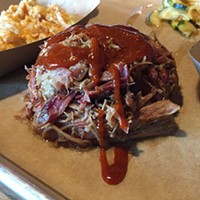Alice Waters is coming to Charlotte this September. To many chefs, restaurateurs and farmers throughout the United States, Waters' name is spoken with reverence. And her Berkeley, Calif., restaurant Chez Panisse has become a destination pilgrimage since it opened in 1971. Waters, who graduated from the University of California at Berkeley in 1967 (the year of the "Summer of Love" in the San Francisco Bay area), has consistently offered her diners the freshest, purist foods procured from her network of local farmers, fishermen and ranchers. The result was a seasonal menu for Chez Panisse and the beginning of a national food revolution.
Waters is coming to Charlotte via a sponsorship of the Charlotte Chapter of Slow Food, an international, non-profit, eco-gastronomic organization founded in 1989 that seeks "to counteract fast food and fast life, the disappearance of local food traditions and people's dwindling interest in the food they eat, where it comes from, how it tastes and how food choices affect the rest of the world." Waters is a member of Slow Food.
To many farmers in the Charlotte area, both Waters and Slow Food represent vanguards in the food evolution movement. Slow Food connects that ecological dot with our eating habits. Eating locally, quite simply, makes more sense. Locally grown food tastes better and, since it doesn't travel far to get to the table, is more ecologically sound.
Yet during the last century, the United States moved away from an agrarian society and small family farms have vanished in many regions. Anyone who has lived in the Charlotte area for 10 years can attest to the replacement of farms with subdivisons.
But especially in light of the growing suspicions on foods imported from countries such as China, an increasing number of people are committing to eating locally. Some organizations sponsor "Localvore challenges," many with exceptions. One in Vermont last winter offered the "Marco Polo" exemption for salt and spices historically used by sailors on long voyages. Is it possible to eat locally here? Sure, but remember, the Piedmont doesn't have any tea and coffee plantations or salt mines.
One way to eat locally is to buy foods from the area farmers markets. Some of them, such as the Matthews Farmers Markets, only sell locally grown foods.
Another method is to own a share in a local farm. Community Supported Agriculture, or CSA, works like this: community members pay a farmer at the beginning of the growing season. The farmer then distributes the bounty of his fields with the members. Many of the farms have in-town pick up points. If the season is prosperous, CSA members have vegetables enough to share with their neighbors. If the season is challenged, the harvest is less. The risk and benefits are shared mutually.
Typically, one CSA share feeds a household of four, two if vegetarian. In the Charlotte region, the growing season runs from April to October, although some farms produce into November. The cost per share varies with the size and production volume of each farm. According to research performed at North Carolina State University, most North Carolina CSA full shares cost between $400 to $700 per year (or $15 to $25 per week of harvest). Since many of these farms grow organically, the cost savings can be significant.
A CSA also reconnects consumers to the land. In Japan this is known as putting a face on the food. This trend to support farmers has increased significantly over the past decade and subsequently many of the CSAs here have waiting lists. (Check www.localharvest.org and www.ces.ncsu.edu for North Carolina CSAs.) Sign ups are typically in the fall for the following year.
Another advantage of being a CSA member is learning the timing of the produce. In Egyptian Arabic, mish-mish means a very short period of time, something akin to "here today, gone tomorrow" since mish-mish apricots only appear briefly in the markets. Since last April my family has delighted in the seasonally changing weekly box from farmer Sammy Koenigsberg of New Town Farms in Waxhaw. One week the box held kohlrabi and gorgeous Bordeaux spinach with deep wine-red veins and stems in the mix. Another week offered Easter egg radishes. July has brought stunning green beans, heirloom tomatoes, several varieties of eggplants and squash and crisp lemon cucumbers.
Eating what is in season is the premise of some diets such as the Stone Age diet, a pre-Neolithic (the age of agriculture) diet focusing on seasonal hunting and gathering. The thought is this: In order to adapt to cold climates, humans loaded up (as in consumed, not stored) during the bountiful warmer season in order to survive the lean winter. This is the inverse of eating habits today, since many eat lean in the summer and heartily in winter. Evolutionary diet proponents argue 20,000 years of DNA is impossible to change during a three-month diet.
Each week as our New Town Farms bounty has grown, the challenge in my home was to consume all the vegetables before the next box. At one point we felt like the overwhelmed Lucy on the chocolate factory line stuffing chocolates into her mouth just to keep up. But this week I took out my grandmother's canning recipes, realizing what generations before me have already known: that at season's end, having Sammy's tomatoes in the pantry will be a treat. And while that doesn't follow a Paleolithic diet scheme, it does make sense in 2007 to try to reconnect with local farmers both for ecological as well as gastronomic reasons.
Have a restaurant tip, compliment, complaint? Do you know of a restaurant that has opened, closed, or should be reviewed? Does your restaurant or shop have news, menu changes, new additions to staff or building, upcoming cuisine or wine events? Note: We need events at least 12 days in advance. Fax information to Eaters' Digest: 704-944-3605, or leave voice mail: 704-522-8334, ext. 136.
Speaking of 3.00000
-

You're Getting Warmer
Dec 12, 2007 -
When White Folks Mess Up
Dec 5, 2007 -

Viva la vie Boheme
Dec 5, 2007 - More »
Latest in Food & Drink Features
More by Tricia Childress
-

Seoul Food Meat Co's got soul
May 4, 2016 -

Aix en Provence flourishes in Myers Park
Apr 6, 2016 -

Pho and beyond at Saigon Bay Vietnamese Cuisine
Mar 2, 2016 - More »
Calendar
-

Charlotte Wine & Food Week’s Annual Sake Dinner at Mizu @ Mizu
-

Hands On Cocktail Class Featuring Gin at DTR Southpark @ DTR SouthPark
-

Angeline’s Featuring Sciandri Family Vineyards @ Angeline's
-

Aria Tuscan Grill Featuring Allegrini - Charlotte Wine + Food Week @ Aria Tuscan Grill
-

Charlotte Wine + Food Week Presented by Truist @ Charlotte, NC
-
Recipe: Ice Cream Sundae Cupcakes 6
These Ice Cream Sundae Cupcakes are filled with chocolate ganache and topped with vanilla buttercream.
-
Back of the Box: No Boil Classic Lasagne 5
Not having to boil the noodles rocks!
-
Authentic & Delicious Indian Restaurant Botiwalla NOW OPEN in Optimist Hall! 2











